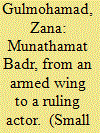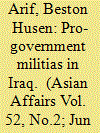| Srl | Item |
| 1 |
ID:
188327


|
|
|
|
|
| Summary/Abstract |
Badr has become a key Shia socio-political-armed organisation in Iraq and has revamped its political and organisational structure. Previously, it was an Iran based and designed Iraqi Shia opposition force, the armed wing of the Supreme Council for the Islamic Revolution in Iraq. Post-2003 it transformed into an incohesive political organisation with an armed wing and engaged in electoral politics. Badr has influenced the state’s apparatus and played a key role in the Popular Mobilisation Forces’ campaign against the Islamic State in Iraq. Primary resources, including interviews, Badr’s media and platforms and publications explain Badr’s approaches and decentralised structure.
|
|
|
|
|
|
|
|
|
|
|
|
|
|
|
|
| 2 |
ID:
179348


|
|
|
|
|
| Summary/Abstract |
Along with Iraqi security forces, pro-government militias, known as Popular Mobilisation Forces (PMF, also “Hashd al-Shaabi” in Arabic), played a significant role in defeating ISIS. Iraq's engagement with these armed groups during the fight against ISIS empowered and legitimised them within the country. Yet, they often committed human rights violations and were involved in violent activities against the United States embassy, personnel, and military bases. However, since 2014, these groups have been acting as pro-government militias and are legally part of the Iraqi security forces. Yet, some of them have declared loyalty to Iran and act as proxy forces for Tehran. This article argues that pro-government militias in post-ISIS Iraq have negative impacts on security and human rights in the country because most of these groups were previously established based on sectarian factors and proximity to Iran. It also argues that while they are largely regarded as having had an essential role in defeating ISIS, their presence in a post-ISIS Iraq will threaten Iraq's stability.
|
|
|
|
|
|
|
|
|
|
|
|
|
|
|
|